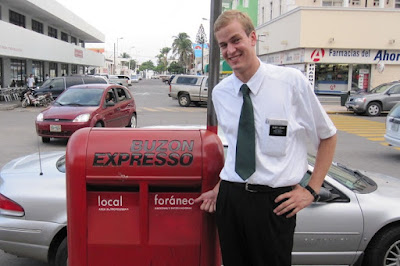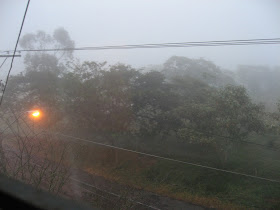November 11, 2007 – November 12, 2007
A view of the Xalapa fog
from our apartment window one morning. Since it’s up in the mountains, Xalapa’s
climate is wet and temperate, even when the rest of the state is sweltering hot.
Fog was common, as was chipi-chipi, which is kind of in between fog and rain,
just little tiny water droplets, sometimes falling, sometimes getting whisked
around in the breeze. I loved it.
Myself and Elder Guerra
one night just outside our apartment in the heavy fog.
The next day
was my first day of church in Mexico. Our church has the same structure and
teaches the same doctrine everywhere in the world, so in some ways going to
church was actually a nice break from all the other unfamiliar things I’d been
dealing with so far. Church is broken into three different meetings, each about
an hour long. The first hour, the men and women split up into different classes:
the men go to priesthood meeting, and the women go to Relief Society meeting.
The second hour, which is Sunday school classes, is mixed gender but divided by
age group. In the last hour, sacrament meeting, everyone meets together in a
large room where we listen to talks prepared by members of the church and take
the sacrament, bread and water representing the body and blood of Jesus Christ.
We were happy
to find that both the Martínez and Guerrero families came to church that day. We
helped them find where to go for their classes and get settled before heading
to our own classes. I was surprised to find that Elder Guerra was going to
teach Gospel Principles, the introductory Sunday school class for new church
members, during the second hour. He explained that there wasn’t a teacher
assigned for that class, so the missionaries regularly stepped in to teach.
From what I could tell, he just picked up the manual a few minutes before class
started and directed an impromptu class discussion on that week’s topic. He was
cheerful and managed the class well. With most of the people in the large class
either recently-joined church members or first-time visitors, their comments
reflected a wide variety of religious backgrounds very different than my own. I
was glad he was the one doing it and not me. I wouldn’t have known even how to
begin.
When everyone
got together for the last meeting, Elder Guerra mentioned that today was the Primary
program, an annual event in which the children’s classes make presentations and
sing songs during sacrament meeting, showing off the things they’d learned in
their classes that year. It didn’t occur to me as a big deal, but Elder Guerra
went on to say that a lot of members were likely to have invited friends to
come visit to see the children put on their program. During the meeting he
quietly pointed out several people he didn’t recognize (I couldn’t have known
since I didn’t recognize anyone yet!). By his count, and including the two
families we’d invited, we had fourteen visitors attend church that day! We
would have a lot of people to teach that week.
That day at
church was also my first opportunity to meet most of the members. A lot of
members would come up and introduce themselves when they saw that I was new. It
wasn’t hard to spot me. I was pale, skinny, and much taller than everyone
there. A lot of the teenagers talked to me using slang I didn’t have any hope
of understanding. I just smiled, nodded, and tried to laugh when I thought they
expected me to. Even without the slang I had a much harder time understanding
people than I’d thought I would, given how much I’d worked on my Spanish. Their
accent was different than anything I’d heard before, and many of them spoke
quickly.
The night
before, during our planning session, Elder Guerra told me we’d be going on “splits”
with some teenagers from the ward after church; he was going to visit some
people with Isaac, and I would go with Manuel and Yael. I had been on the other
side of them as a teen back home, when I worked for a couple of hours with one
of the missionaries while another member went with the other missionary. But in
this case I was more than a little nervous about being without my trainer when
I’d been in Mexico for less than a week.
Splits made for
an interesting afternoon. Without Elder Guerra, I was suddenly the
“responsible” one who was supposed to know what he was doing. Thankfully,
Manuel and Yael knew their way around the areas we worked, so they helped me
avoid getting lost on our way to make some visits. We talked to people in the
street as we went. The two of them were much bolder than I’d ever been when I
went on splits with the missionaries back home as a teenager. They each took turns
introducing themselves as members of the church and asked if the person was
interested in hearing our message. They hadn’t been trained like me, but they
weren’t afraid to share their beliefs.
Things got more
complicated when we finally taught a lesson that afternoon. Elder Guerra
usually took the lead with most of our lessons; I taught sections of them, but
I usually relied on Elder Guerra to keep track of how it was going and correct
my mistakes. When we sat down in the house of the woman that had invited us in,
Manuel and Yael just looked at me, the same way I usually just looked at Elder
Guerra. I did my best to teach the whole lesson; I felt like the woman at least
understood the words I was speaking, but when she spoke, I usually had to turn
to Manuel and Yael to make sure I understood her correctly. I prompted the two
of them to share their own experiences as church members. They did great; they
were sincere and even invited the woman to church next week. Working in splits
was super hard work; I had to think a lot harder about everything, and I
couldn’t just let my companion take over when I didn’t know what to say, but it
gave me confidence that I could be a capable missionary when I put my mind to
it.
A few hours
later, we got back together with Elder Guerra and said goodbye to Isaac,
Manuel, and Yael. Elder Guerra and I headed back to our apartment to gather up
and pass on the weekly missionary data. Elder Guerra was a district leader,
which meant that he oversaw another two companionships of missionaries in
Xalapa. His district included a pair of sister missionaries and the pair of
zone leader elders, each pair working in nearby wards. Elder Guerra would call
the sisters, ask them about their work that week, find out about investigators
they were teaching and offer encouragement and advice as to how to meet their
goals the next week. Then he would talk to me and we would go over our own
goals the same way. Once he had all the info he needed, he would call the zone
leaders to pass it on to them. They, in turn, reported to the assistants, and
the assistants to the mission president, in kind of a pyramid of leadership.
This happened each Sunday night and sometimes took a decent chunk of time.
The next day (Monday)
was my first P-day (our “day off”) in the field. We were able to sleep in a
little bit that morning, which was nice. Once we were ready, we got on a bus to
take our laundry to a family in the ward that washed it for us. It was really
nice of them; laundry can take up several precious hours of our P-day, which
only lasts until 6:00 PM, when we have to go back to work. The few times on my
mission that a member was willing to do our laundry for us always made a
difference.
After dropping
it off and chatting for a bit, we went to get Elder Guerra a haircut. The
haircut took way longer than we’d expected, so that took a lot of time out of
our day, unfortunately. Then we stopped nearby at an internet café to check our
email. Out in the field, we were allowed an hour to read the mission
announcement email, write the mission president a report on our area the past
week, and read and respond to family emails. I tend to write slowly, so I
always wished I had more time.
When we were
done, we went back to our apartment where I was able to handwrite a letter or
two. At this point the only communication I’d had from back home were those
emails. As I later found out, snail mail takes a really long time to get
between the states and missionaries in Mexico. Apart from having to go through
border stops and the like, my only functional address was the mission offices
in the city of Veracruz. Our apartment had an address, theoretically, but you couldn’t
rely on the Mexican post to actually get it to you there. So any letters sent
to me accumulated in the mission offices until a zone conference or other
reason for the mission president to visit my local zone, and he would bring the
mail along with him. Letters were more likely (though still not certain) to get
to us this way, but it could take about six weeks from time of putting a letter
in the mailbox to the time I’d receive it. Me sending letters home took almost
as long. Even so, letters were always a nice pick-me-up. They reminded me that
the rest of the world still exists, and I always appreciated getting them from
friends and family, even when I didn’t have time to write back.
And that’s how my
first week in Mexico went. I can’t say it was a typical one, but it does stick
in my mind.



You wrote a couple of letters, eh? Who were the lucky ladies? :) I'm pretty sure I was one of them! Even though it took FOREVER.
ReplyDelete